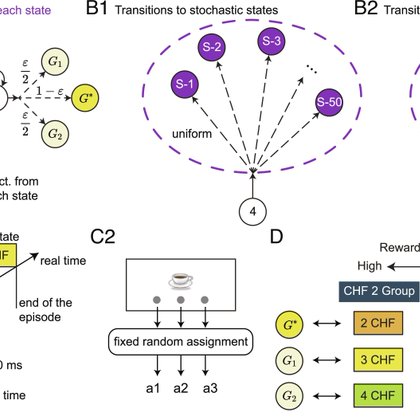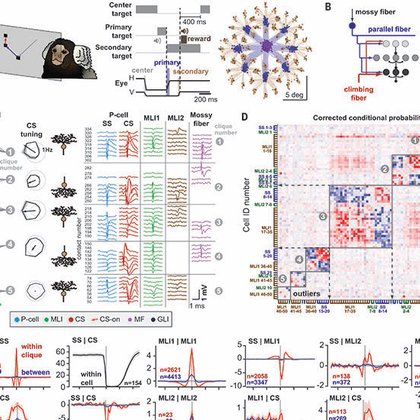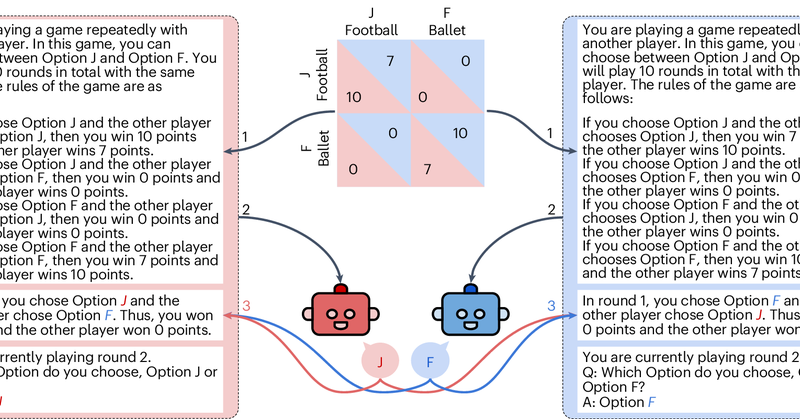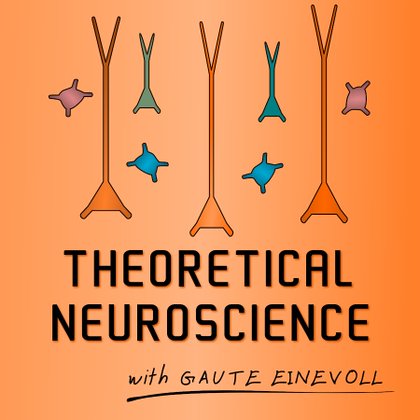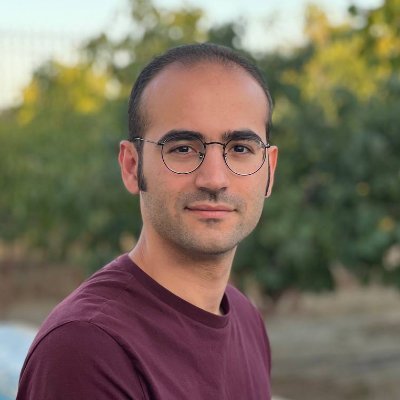
Alireza Modirshanechi
@modirshanechi
Followers
760
Following
7K
Media
44
Statuses
944
Postdoc @cpilab & @MPICybernetics || PhD @compneuro_epfl and @EPFL_en || Working on computational models of learning and decision-making in the brain
Munich, Germany
Joined August 2018
New in @PNASNews: https://t.co/95Gs0QTYf4 We study how humans explore a 61-state environment with a stochastic region that mimics a “noisy-TV.” Results: Participants keep exploring the stochastic part even when it’s unhelpful, and novelty-seeking best explains this behavior.
0
2
9
PNAS Novelty as a drive of human exploration in complex stochastic environments https://t.co/EjErRr7zJB
pnas.org
In order to find extrinsic rewards, humans explore their environment even if exploration requires several intermediate, reward-free decisions. It h...
1
7
60
Novelty as a drive of human exploration in complex stochastic environments | PNAS
pnas.org
In order to find extrinsic rewards, humans explore their environment even if exploration requires several intermediate, reward-free decisions. It h...
0
6
15
New in @PNASNews: https://t.co/95Gs0QTYf4 We study how humans explore a 61-state environment with a stochastic region that mimics a “noisy-TV.” Results: Participants keep exploring the stochastic part even when it’s unhelpful, and novelty-seeking best explains this behavior.
0
2
9
Thrilled to see our TinyRNN paper in @nature! We show how tiny RNNs predict choices of individual subjects accurately while staying fully interpretable. This approach can transform how we model cognitive processes in both healthy and disordered decisions.
nature.com
Nature - Modelling biological decision-making with tiny recurrent neural networks enables more accurate predictions of animal choices than classical cognitive models and offers insights into the...
4
55
272
Excited to see our Centaur project out in @Nature. TL;DR: Centaur is a computational model that predicts and simulates human behavior for any experiment described in natural language.
4
57
181
Just 4 weeks until the abstract deadline for Curiosity, Information Seeking & Exploration - https://t.co/svlhThVZDI 🗓️30th Sept-1st Oct 📍@BrownUniversity 👥@froemero1, @hayleydorfman, @dan_ohad, @NassarLab, @affectivebrain & Jacqueline Gottlieb 👇Speakers Submit & share!
2
4
5
1/ 🚨 Updated preprint: “Generating Computational Cognitive Models using Large Language Models” 👥 Co-led by @milenamr7 with Marvin Mathony, Tobias Ludwig & @cpilab 📄 Check full paper here: https://t.co/DrvSmqOjHV
5
10
27
First first-author paper now in @ScienceMagazine! Great thanks to incredible mentor @reziliusReza and coauthors @just_alden @pauliehage @HElseweifi. We asked how neurons in the cerebellar cortex control rapid eye movements (saccades). 1/3 https://t.co/5Cf5cGHlGa
science.org
Null space theory predicts that neurons generate spikes not only to produce behavior but also to prevent the undesirable effect of other neurons on behavior. In this work, we show that this competi...
14
38
226
I am pleased to announce a new version of my RL tutorial. Major update to the LLM chapter (eg DPO, GRPO, thinking), minor updates to the MARL and MBRL chapters and various sections (eg offline RL, DPG, etc). Enjoy! https://t.co/SjMdabl0yW
24
445
2K
🌍 Science knows no borders! 🔬 In a world where international exchange faces challenges, research thrives on collaboration. Together, we will shape the future! 🚀 #STEM #GlobalResearch #Innovation #Cybernetics #Neuroscience #Internatioanality #OneWorld
0
2
11
What happens when Large Language models play repeated economic games? This new study from @elifakata et al investigates across a range of models and games. @cpilab
https://t.co/ID2d6mg5sz
nature.com
Nature Human Behaviour - Large language models perform well in self-interested games such as the iterated Prisoner’s Dilemma but struggle in games that require coordination. Social reasoning...
0
23
98
Thank you for featuring my work! 😃🥳🤩 I'm currently investigating more of the process mechanisms adopted by humans (and AI) in divergent thinking!
🧠🤖 New study led by @surabhisnath reveals striking parallels between human and AI creativity. Both people and LLMs use flexible and persistent strategies — but AI leans into one at a time. Pairing people with complementary LLMs could supercharge co-creation. 👉
0
4
25
🚨 We're hiring! If you're excited about 🤖 ML/LLMs, 🧠 cognitive science, or 💭 computational psychiatry, come join us in Munich. Two fully funded PhDs @HelmholtzMunich: great mentorship, international vibe, lots of room to grow. 📅 May 16th 🔗 https://t.co/j0mwz9LFNx
3
32
113
Looking for a Ph.D. position? 🧪👩🔬 Come and join our super cool group in Munich! 🥳 We have an enjoyable, collaborative, and inclusive environment where the level of scientific curiosity is truly refreshing! 🤓🥰
We are looking for two PhD students at our institute in Munich. Both postions are open-topic, so anything between cognitive science and machine learning is possible. More information: https://t.co/wBE0mau7p3 Feel free to share broadly!
1
38
139
So excited to announce Curiosity, Information Seeking & Exploration conference: 30th Sept-1st Oct @BrownUniversity. Amazing speakers https://t.co/M7vUAB9h1Q and free! Abstract submissions are open until 7th July With @froemero1 @hayleydorfman @dan_ohad @NassarLab. Please share!
sites.google.com
Jacqueline Gottlieb
1
15
21
Our paper (with @elifakata, @MatthiasBethge, @cpilab) on visual cognition in multimodal large language models is now out in @NatMachIntell. We find that VLMs fall short of human capabilities in intuitive physics, causal reasoning, and intuitive psychology.
nature.com
Nature Machine Intelligence - Modern vision-based language models face challenges with complex physical interactions, causal reasoning and intuitive psychology. Schulze Buschoff and colleagues...
1
10
43
Videos for my #TheoreticalNeurosciencePodcast can now be seen in my new YouTube channel. 9 of 23 episodes uploaded as of now, all 23 will be available from January 20. And #24 will be released on February 1st. Take a look at:
youtube.com
The Theoretical Neuroscience Podcast focuses on topics in theoretical/computational neuroscience and is primarily aimed at students and researchers in the field. The podcast is produced by Gaute T....
0
9
45
Super excited to see my PhD thesis featured by EPFL! 🎓 It's such a great honor — thank you for sharing it with the world. 🚀🥰 P.S.: There's even a French version of the article! It feels so fancy! 😎 👨🎨 🇫🇷
🧠💻 A researcher from our school, working at the crossroads of neuroscience and computational science has developed an algorithm that can predict how surprise and novelty affect behavior. https://t.co/BHkaiwCWrd
1
1
44
To conclude, however crazy some radical behaviourist positions and claims may sound, I have to admit that I somehow admire their epistemological boldness and I seriously believe they must have been fun to hang out and argue with 🤓 end/n
2
1
27




